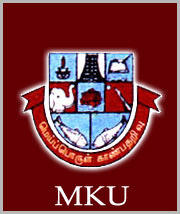 | |
| Motto | "To Seek Truth Is Knowledge" |
|---|---|
| Type | Public research university |
| Established | 1966 |
| Chancellor | Governor of Tamil Nadu |
| Vice-Chancellor | Vacant |
| Location | , , |
| Campus | Urban |
| Website | www.mkuuniversity.org www.mkudde.org |
 | |
Madurai Kamaraj University (MKU) is a public state university located in Madurai city, in southern Tamil Nadu, India, that was established in 1966. MKU is one of the 15 universities in India with the University with Potential for Excellence status, which was awarded by the University Grants Commission (UGC) in India. [1] In 2021, the university was awarded an 'A++' grade from the National Assessment and Accreditation Council (NAAC) in its 4th cycle. [2]
